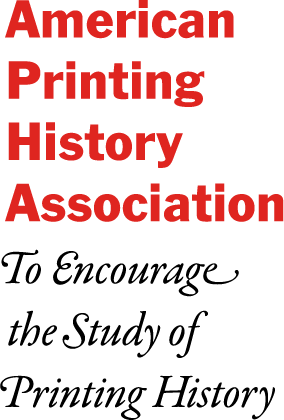Cardboard Collins

Left: Portrait photo of Alexander Washington Collins from The Inland Printer, May 1918 (courtesy of the Berkeley Updike Collection, Providence Public Library). Right: title page from Alexander Lawson’s Press of the Good Mountain edition of Henry Lewis Bullen’s, Only a Compositor, 1962 (from the author’s collection).
The Pittsburgh compositor Alexander Collins (1870–1918) was an ordinary printshop journeyman, never prominent, and he remains obscure. Collins, however, surfaced briefly in the early twentieth century, an appearance that gives us a glimpse at a tradesman’s world on the edge of change. Collins worked for a big-city commercial printing firm. His thirty shopfloor years overlapped those of nineteenth-century industry titans De Vinne and Hoe as well as an emerging group of differently distinguished printers such as Bruce Rogers, Will Ransom, and Dard Hunter. Exceptional twentieth-century printing was shifting from shopfloor to salon. Printerdom, a workplace culture filled with tradesmen like Collins, would change as well.
Collins was a compositor, a job printer. He was born in Salisbury, Maryland, and apprenticed (in 1889) at the local Wicomico News before spending most of his working life at Pittsburgh’s Hall Printing Company. Collins specialized in “blank work,” the tabular tasks of billhead, information sheets, and order forms. “You can appreciate the importance of accuracy in this line of work and can form some idea of his ability,” said an employer, “when you realize that he has been known to set a blank the size of double royal—with numerous box headings and columns of figures—set it so that when the form was put on press there would be no time spent in adjusting, except with the guides.”1 Well, nobody said that about Bruce Rogers.
Collins was grumpy. Always precise, he was “nervous and irritable,” a crabby fellow who annoyed everybody. Because of his specialty, shopmates called him “Cardboard Collins.”2 He turns up three times in the history of printing and bookmaking. In 1918, Henry Lewis Bullen, a director at the American Type Founders corporation, wrote a patronizing Inland Printer piece about Collins titled “Only a Compositor.” Much later, in 1962, Alexander Lawson reprinted that essay, and later still Lawson revisited Collins—or, rather, Bullen’s original essay on Collins—in his 1990 book The Compositor.3
What made Collins special to Henry Bullen hadn’t been his craft, but connoisseurship. Collins was a bibliophile. Over the years, he had compiled a bibliography of the published writing of the noted printer Theodore Low De Vinne. In 1910, he offered that compilation to Bullen, who found it remarkable that Collins—“only a compositor”—actually read the literature of his trade. When, in 1914, New York’s Grolier Club feted De Vinne, the city’s printing mogul, it published Collins’s complete De Vinne bibliography (very nearly without crediting Collins).4At his death, in 1918, Collins bequeathed his personal printing library to the American Type Founders.5
Recently, Lisa Gitelman, professor of English and of Media, Culture, and Communication at New York University, published Paper Knowledge: Toward a Media History of Documents (Duke, 2014). The book separates job printing from that of books and newspapers and establishes a nineteenth-century workers’ domain she calls “printerdom.” Gitelman considers jobbing tradesmen like Alexander Collins the essence of “printerdom.” Such printers, says Gitelman, had forged a commonality. “[A] part from the printed materials produced, printers’ supplies, printers’ literature, and printers’ labor circulated effectively to produce a coherent trade, a partly imagined and partly enacted integration of localities according to both ideology and economics.”6
Gitelman’s printerdom is a conceptual framework, a scaffolding that Alexander Collins inhabits. It’s not that Gitelman, following Bullen and Lawson, rediscovers Collins—she doesn’t mention him at all. Rather, she reconceives his world. The function of job printing, says Gitelman, is cultural mediation, and the prime expression of this is blank book printing. Among job printers, Collins was a blank book specialist—not books of empty pages of the kind craft printers and binders turn out today, but volumes filled with ruled pages, empty boxes, and slots to fill. “Blanks make bureaucracy,” Gitelman says, they “rationalize work” and are “one small part of the way that bureaucracy assumes an objective character.”7
There are a couple of ways, then, to consider Collins. One option contextualizes Collins’s trade and makes him significant in abstraction. “Printerdom,” Collins’s world, is a cultural generalization that describes an emerging modernity. There remains a second angle. We can take Collins on his own terms, an exemplary if anonymous journeyman printer. Collins’s job work demanded careful precision and extraordinary technical excellence. In 1918, Henry Lewis Bullen had diminished him with the faint praise of comparison with Bruce Rogers and the more Alexander Lawson pointed this out, the more Collins shrank. But consider what Collins actually did. He handled the work that apprentices—never mind Henry Bullen—snickered at. In printing—in life—someone set texts that were difficult past compensation, scarcely worth the skill. Someone took on the ad flyers. Somebody set the math.
- 1 Robert L. Forsythe to Henry Lewis Bullen, February 22, 1918, Box 49, Henry Lewis Bullen Papers, Typographic Library Manuscript Collection, Butler Library, Columbia University.
- 2 Unintelligible to Bullen, Feb 21, 1918, Box 49, Bullen Papers.
- 3 Henry Lewis Bullen, “Only a Compositor” in Inland Printer May (Vol. 61, No. 2) 1918, 191; Bullen, Only a Compositor (Rochester, N.Y.: Press of the Good Mountain, 1962); Alexander Lawson, The Compositor as Artist, Craftsman, and Tradesman (Athens, Georgia: The Press of the Nightowl, 1990). Irene Tichenor cites Collins’s bibliographic work in an appendix to her No Art without Craft: The Life of Theodore Low De Vinne (Boston: David R. Godine, 2005), 267.
- 4 Bullen to Alexander Collins, April 13, 1914, Box 49, Bullen Papers.
- 5 The bulk of the American Typefounders’s Jersey City typographic library would become the Typographic Library Manuscript Collection, Butler Library, Columbia University.
- 6 Lisa Gitelman, Paper Knowledge: Toward a Media History of Documents (Durham and London: Duke University Press, 2014), 45.
- 7 Gitelman, Paper Knowledge, 30-31.
